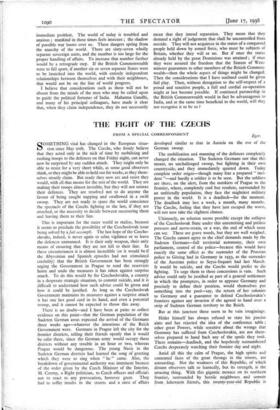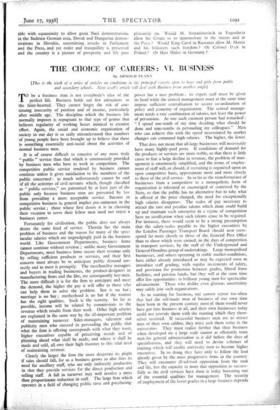THE FIGHT OF THE CZECHS
FROM A SPECIAL CORRESPONDENT
SOMETHING vital has changed in the European situa- tion since May 2oth. The Czechs, who firmly believe that they acted only in the nick of time by mobilising and rushing troops to the defences on that Friday night, can never now be surprised by any sudden attack. They might only be able to resist for a very short while, as some good observers think, or they might be able to hold out for weeks, as they them- selves stoutly claim. But ready they now are and resist they would, with all that means for the rest of the world. They are making their troops almost invisible, but they will not unman their defences. They are resolved not to do anyone the favour of being caught napping and swallowed in a swift swoop. They are not ready to spare the world conscience the spectacle of the Czechs fighting to the last, if they are attacked, or the necessity to decide between succouring them and leaving them to their fate.
This is important for the outer world to realise, because it seems to preclude the possibility of the Czechoslovak issue being solved by a fait accompli. The last hope of the Czecho- slovaks, indeed, is never again to relax vigilance or to leave the defences unmanned. It is their only weapon, their only means of ensuring that they are not left to their fate. In these circumstances it is almost incredible (or it would be if the Abyssinian and Spanish episodes had not stimulated credulity) that the British Government has been strongly urging the Government in Prague to send the reservists home and undo the measures it has taken against surprise attack. To do this would be for Czechoslovakia, a country in a desperate strategic situation, to commit suicide, and it is difficult to understand how such advice could be given and how it could be justified. As long as the Czechoslovak Government maintains its measures against a surprise attack it has one last good card in its hand, and even a potential trump, and it cannot be expected to throw this away.
There is no doubt—and I have been at pains to collect evidence on this point—that the German population of the Sudeten German areas expected the arrival of the Germans three weeks ago—whatever the intentions of the Reich Government were. Germans in Prague left the city for the frontier districts, telling their friends openly that it would be safer there, since the German army would occupy these districts without any trouble in an hour or two, whereas Prague would be dangerous. The young Nazis in the Sudeten German districts had learned the song of greeting which they were to sing when " he " came. Also, the breakdown of governmental authority was imminent because of the order given by the Czech Minister of the Interior, M. Czerny, a Right politician, to Czech officers and officials not to react to any provocation, however great. They had to suffer insults in the streets and a state of affairs developed similar to that in Austria on the eve of the German swoop.
The mobilisation and manning of the defences completely changed the situation. The Sudeten Germans saw that this meant, no unchallenged swoop, but fighting in their own countryside, and they immediately quieted down. Today complete order reigns—though many fear a prepared " inci- dent "—and hardly a soldier is to be seen. But the soldiers are there, on the alert, from the outskirts of Prague to the frontier, where, completely cool but resolute, surrounded by an unfriendly population, they face the mightiest military power in the world. It is a deadlock—for the moment. The deadlock may last a week, a month, many months. The Czechs, feeling that they have just escaped the worst, will not now take the slightest chance.
Ultimately, no solution seems possible except the collapse of the Czechoslovak State under this unremitting and pitiless pressure and nerve-strain, or a war, the end of which none can see. These are grave words, but they are well weighed. The Czechs cannot agree to the chief demands made by the Sudeten Germans—full territorial autonomy, their own parliament, control of the police—because this would have exactly the same effect as the surrender of the Prussian police to Goring had in Germany in 1933, as the surrender of the Austrian police to Seyss-Inquart had last March. It would be suicide, and the Czechs would prefer to die fighting. To urge them to these concessions is vain. Such advice could only be justified as part of a general" settlement in which the prompters, in order to appease Germany and precisely to define their position, would themselves put something into the pool—say, the return of her colonies to Germany and a guarantee to defend Czechoslovakia's frontiers against any invasion if she agreed to hand over a strip of Sudeten German territory to the Reich.
But at this juncture these seem to be vain imaginings.
Hitler himself has always refused to state his precise aims and has rejected the idea of the conference table ; other great Powers, while sensitive about the wrongs that Germany has suffered from Czechoslovakia, are not them- selves prepared to hand back any of the spoils they took. There remains—deadlock, and the hopelessly outnumbered Czechs desperately watching their frontier day and night.
Amid all this the calm of Prague, the high spirits and contented faces of the great throngs in the streets, are astounding. Not the weakness of this Republic, of which distant observers talk so learnedly, but its strength, is the amazing thing. With this gigantic menace on its northern frontier, surrounded by hostile neighbours and remote from.: lukewarin friends, this twenty-yeai-old Republic is able with equanimity to allow great Nazi demonstrations in the Sudeten German area, Slovak and Hungarian demon- strations in Slovakia, unremitting attacks in Parliament and the Press, and yet order and tranquillity is preserved and the country is a picture of prosperity and life goes pleasantly on. Would M. Stoyadinovitch in Yugoslavia allow his Croats so to demonstrate in the streets and in the Press ? Would King Carol in Rumania allow M. Maniu and his followers such freedom ? Or Colonel D2ck in Poland ? Or Herr Hitler in Germany ?



















































 Previous page
Previous page